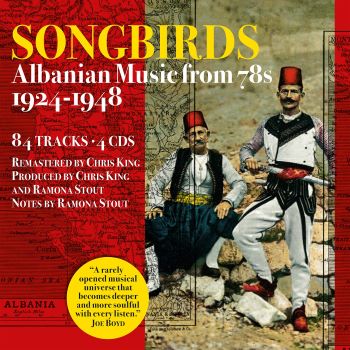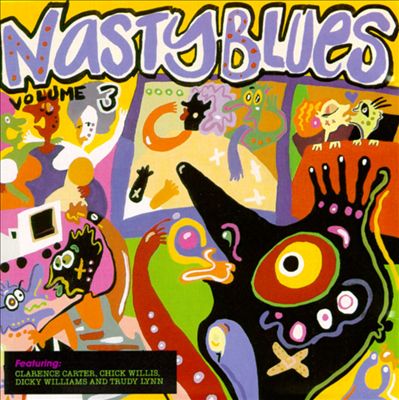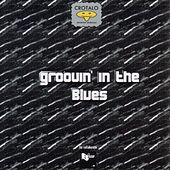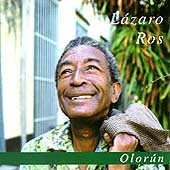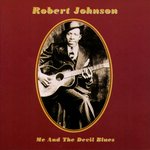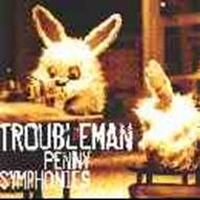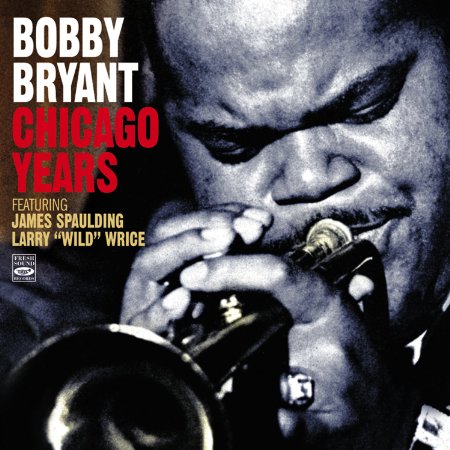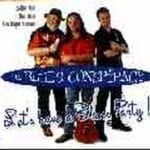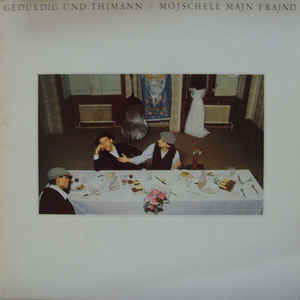Various – Songbirds – Albanian Music From 78s | 1924-1948 – 4CD
€24,20
Description
“A rarely opened musical universe that becomes deeper and more soulful with every listen.” Joe Boyd
A unique and masterful look at the amazing Folk Music of Albania compiled by the Grammy Award winning Chris King. There has never been a previous release like this. It is evocative and haunting music from the mountains with deep historical roots and will be a must buy for the growing number of people searching out the roots of World Music. Within Albania are two main groups – Ghegs in the north and the Tosks in the south. Gheg songs are characterized by monophony, well-defined rhythm and musical accompaniment. The Tosk tradition is defined by polyphony, imitative melodic lines and, prior to urbanization, a total absence of musical accompaniment.
Track Listing:
CD1:
Islam Jonuzi and Friends: 1. E Qarë e Leskovikut - Çoban Arifi and Sabri Fehimi: 2. Me Doçkën e Bardhë - Riza Bylbyli: 3. Korba o Çeço - Vangjel Leskovikut: 4. Kaba me Gërnetë - Selim Asllani and Group: 5. Valle Krushkave - Selim Asllani and Hafize Asllani: 6. Laca Kapetani - Zonja Qerimé and Friends: 7. Ballét me Sedef - Riza Bylbyli: 8. Pogonishte - Jonuzi and Friends: 9. Valle Devolliçe - Andrea Pappas, Athanas Mone: 10. E Mjera Unë e Mjera - Jonus Lamçe and Sabri Fehimi: 11. Valle Devolliçe - C. Cercis Nesim: 12. Dorën o Djal Dorën - Riza Bylbyli: 13. (Vlonë) Kapitani i Vlonës - 14. Bahje Dru me Pershullim - Konitsa (real name unknown): 15. Vallja e Manushaqeve - Z. Kjuj: 16. Ngrehun Mahmudi - Grupi Sazet: 17. Valle Kolonjare - Zoj Hatixhja: 18. Ç’u Ngrys Herët në Mjes- Riza Bylbyli: 19. Kishin Uj Ata Burime - Paulin Pali (of Shkodër): 20.Re Moj Vajz e Mas Qit Ojna - Girls Choir of the Franciscan Convent of Shkodër: 21. Valle Shqipnijet -
CD2:
Xhemal Asllani and Sabri Fehimi: 1. Hunde Bukur Qelibar - Selim Asllani and Hafize Asllani: 2. Viktori t’u Bëftë Nëna - Konitsa (real name unknown): 3. Valle me Dy - Selim Asllani and Hafize Asllani: 4.Goca e Berberit - Musikantet Zotto (Thomas Zotto violin): 5. Taksim-Sazesh - Rafail Bulgareci and Risto Pandavani: 6. Nja Shtatë Kokona Duall në Vodenë - Selim Asllani and Hafize Asllani: 7. Untitase Me Sake - Z. Hamid Latifi: 8. Prendoj Dilli Dha Aksham - Z. Islami Riza: 9. Lace Gjinokastra - Selim Asllani and Hafize Asllani: 10. Valle Sta Triya - Zoti Xhemal Asllani: 11. Ne Rrapi në Mashkullor (Gjinokastrite) - Selim Asllani and Hafize Asllani: 12. E Qarë e Asllan Leskovikut - Riza Bylbyli: 13. Sikur Merrje Xhemalin - Z. Kjuj: 14. Kanga E Dhandrrit - Jonus Lamçe and Sabri Fehimi: 15. E Qarë me Gërnetë - Selim Asllani and Hafize Asllani: 16. Tjalem t’Ambël Seç Ma Ke - Jonuzi and Friends: 17. Valle Beraçe - Ajdin Asllani (Nichola Doneff violin, Beqir Hyman, Ilias Permeti vocals): 18. Këngë Si Hëna Katërmbëdhjetë - Shoqnija Toshkrisht: 19. Napuljoni Izet Bej Taksim - Riza Bylbyli: 20.Osman Taka - Mati Kola (Instrumental trio): 21. Ç’e Ninjova Ramazanin -
CD3:
Selim Asllani and Hafize Asllani: 1. E Qarë e Selimit - Chiorchi Gazel: 2. Delvino Zaza Delvina - Pando Opingari (Fyell, Spiridon T. Ilo guitar): 3. Valle Kasapçe - Konitsa (real name unknown): 4. Samari i Bariut - Z. Islami Riza: 5. Bahje Dru me Pershullim - Rafail Bulgareci and Risto Pandavani: 6. Mos e Mer Rrëmbyer - Unknown (violin & laouto): 7. Valle Çamçe - Z. Sylejmani: 8. Alija Fetah Rikut - Riza Berati: 9. Ç’a Miku - Selim Asllani and Hafize Asllani: 10. Hysnije Moj Dylbere - 11. Kush Të Ka Moj Ruskë - Rukia me Gocat e Eumes Tiranë: 12. E Bukur Je Fatime - Pando Opingari (Pando Opingari fyell, Louis Rassias lauto): 13. Valle Devolliçe - Selim Asllani: 14. Valle Hasanajt, e Shtruar - Spiridon T. Ilo (vocal, Pando Opingari fyell, Louis Rassias laouto): 15. Kënga e Bektashinjve - Z. Sadik Azbiu: 16. Vajza e Valavet - Z. Cercis Nesim: 17. Ballet me Sadefe Korçarçe - Jonuzi and Friends: 18. Këngë e Gjethes - Ajdin Asllani (Clarinet, prob. Nichola Donnef violin) : 19. E Qarë Kaba me Gërnetë - Ajdin Asllani (Clarinet, Dino Ilias san): 20. Këng e Gjethës - Rizai with Friends: 21. E Qjare e Merenkes
CD4:
Riza Bylbyli: 1. Taksim Myzeqarçe - K. Afes Shok and Selim Asllani: 2. Vura Shkallët Mbi Avlli - Zoj. Havaja: 3. Moj e Vogla Saj Mexhide - Vellajt Tija and Sabri Fehimi: 4. E Qarë e Bajram Fehimit - Z. Cercis Nesim: 5. E Tredelines - Chiorchi Gazeli: 6. Kapetan Kirjako - Çerçis Nesim and Sabri Fehimi: 7. Kur Më Shkon Sokakut - Mehdi Permeti: 8. E Qarë me Gërnetë, Kaba - Jonuzi and Friends: 9. Viktori t’u Bëftë Nëna - Unknown Musicians: 10. Valle Salushe - Selim Asllani and Hafize Asllani: 11. Kur Jeçë Vetum - Riza Bylbyli: 12. Kapitani Las - Jonuzi and Friends: 13. Vome Kabá - Selim Asllani: 14. Valle Janë dy Kunata - K. Afes Shok and Selim Asllani: 15. Keta Lesh Si Filli Arit - Llaqi and Friends (Sextet): 16. Çobankat që Shkojnë Zallit - Z. Sylejmani: 17. Medet, Medet Kam Nji Mik - Selim Asllani and Hafize Asllani: 18. Dembe Katarose - Riza Bylbyli (Berati): 19. Ja Thoshte Bylbyli - Adjin Asllani (Clarinet, unknown san, Nichola Donnef violin): 20. E Trendelinës (Valle dhe Këngë) - Girls Choir of the Franciscan Convent of Shkodër: 21. Ora e Shqypnis -
Sleeve Notes:
There are a lot of things people don’t know about Albania. They might not know that Albania is one of the most awe-inspiringly beautiful countries in Europe. Or that its people are, in this author’s opinion, some of the kindest and most hospitable on Earth. And they might not know what Albanian music sounds like.
Albania holds several groups of people within its borders. The primary division lies between Ghegs, who inhabit the territory north of the Shkumbin river, and Tosks, who live south of it. There are only a small number of songs on this collection that might be labelled as ‘Gheg’ – characterized by monophony, well-defined rhythm and musical accompaniment (today often a two-stringed chifteli). The most distinctly so feature a single, strident voice and a triumphal tone that recalls the northern tradition of epic poetry. The Tosk musical dialect is defined by polyphony, imitative melodic lines and, prior to urbanization, a total absence of musical accompaniment.
Songbirds use song for all kinds of things, for mating, for defense, to mark territory, for gossip and mimicry. Each species has its own repertoire and each bird has its own, unique voice. There are three very interesting things about songbirds’ melodies. Firstly, individual species’ songs change depending on their habitat, low frequencies are better for areas with dense vegetation, high frequencies better for open planes, and plain loud is, commonsensically, better for city life. Each species, therefore, has its own acoustic niche. Secondly, although the basic song is the same for all members of a given species, each individual bird learns its song from its father, taking on his idiosyncrasies and then layering them with his own, and on down the line. Lastly, over time, this dialect will become richer and richer, the repertoire broader, the closer this bird stays to home.
There are three distinct musical sub-dialects of Tosk—Tosk, Çam and Myzeqar. The Tosk sub-dialect is heavily represented in this collection, particularly by the Asllani family of Leskovik, who not only recorded prolifically but were also responsible for three of the labels represented on this collection. The eldest brother, Ajdin, owned and operated both MI-RE and ME-RE and, finally, BALKAN, making recordings in New York, Detroit, Thessaloniki, Ioannina, Athens, and Istanbul.
It is fair to assume that the majority of the musicians featured on this collection were drawn from the Roma and Jevg minorities. Players from both ethnic groups have been integral to Albanian folk music’s development and marked distinction from surrounding traditions, at least since these recordings were made, and undoubtedly for many centuries prior.
Most of the music is drawn from a very distinct ‘acoustic niche’ in a very particular place, southern Albania—a topography, a way of life—in a dialect laid down, layer upon layer, from parent to child, over many hundreds of years. This music is rendered in a musical dialect both very rich and very close to home. Imagine the former inhabitants of Leskovik coming home at the end of a long day pulling their grocery cart through the streets of Boston to drop the needle on one of these 78s, or tuning in to Nuçi Cujo’s radio hour, and hearing their song. We may not have heard this song before, but with a little training conflict gives way to a singular harmony, and emotions ring crystal clear.
Ramona Stout
You may also like…
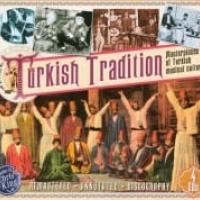
Various
Turkish TraditionMasterpieces Of Turkish Music – 4CD
Compiled by the Grammy Award Winning Chris King. All tracks collected from Istanbul flea markets and back alleys but gloriously…
Read more Read more€24,20
